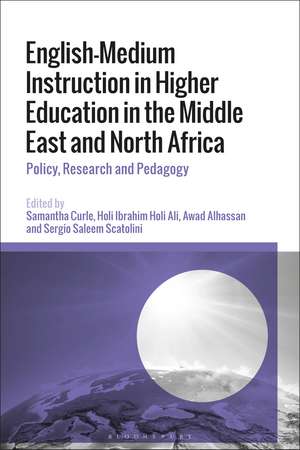English-Medium Instruction in Higher Education in the Middle East and North Africa: Policy, Research and Pedagogy
Editat de Dr Samantha Curle, Dr Holi Ibrahim Holi Ali, Dr Awad Alhassan, Dr Sergio Saleem Scatolinien Limba Engleză Paperback – 24 ian 2024
| Toate formatele și edițiile | Preț | Express |
|---|---|---|
| Paperback (1) | 190.75 lei 6-8 săpt. | |
| Bloomsbury Publishing – 24 ian 2024 | 190.75 lei 6-8 săpt. | |
| Hardback (1) | 568.40 lei 6-8 săpt. | |
| Bloomsbury Publishing – 13 iul 2022 | 568.40 lei 6-8 săpt. |
Preț: 190.75 lei
Preț vechi: 249.05 lei
-23% Nou
Puncte Express: 286
Preț estimativ în valută:
36.50€ • 39.03$ • 30.43£
36.50€ • 39.03$ • 30.43£
Carte tipărită la comandă
Livrare economică 17 aprilie-01 mai
Preluare comenzi: 021 569.72.76
Specificații
ISBN-13: 9781350238589
ISBN-10: 1350238589
Pagini: 216
Ilustrații: 10 bw illus
Dimensiuni: 156 x 234 x 25 mm
Greutate: 0.31 kg
Editura: Bloomsbury Publishing
Colecția Bloomsbury Academic
Locul publicării:London, United Kingdom
ISBN-10: 1350238589
Pagini: 216
Ilustrații: 10 bw illus
Dimensiuni: 156 x 234 x 25 mm
Greutate: 0.31 kg
Editura: Bloomsbury Publishing
Colecția Bloomsbury Academic
Locul publicării:London, United Kingdom
Caracteristici
Authored by researchers with first-hand experience in countries in the region, including Iran, Kuwait, Morocco, Oman, Saudi Arabia, Sudan, and Turkey
Notă biografică
Samantha Curle is Assistant Professor of Applied Linguistics in the Department of Education, University of Bath, UK. Holi Ibrahim Holi Ali is Assistant Professor of Applied Linguistics in the Department of English Language & Literature, Rustaq College of Education, Oman. Awad Alhassan is Assistant Professor of Applied Linguistics & TESOL at Dhofar University, Oman.Sergio Saleem Scatolini is Assistant Professor in the Department of English Language and Literature at Rustaq College of Education, Oman.
Cuprins
Introduction, Samantha Curle (University of Bath, UK1. EMI in the Arab World: A Decolonial Interrogation, Berrington Ntombela (University of Zululand, South Africa)2. University Students and Instructors' Attitudes towards English-Medium Instruction Courses: Voices from Iran, Ali Derakhshan (Golestan University, Iran), Mahboubeh Rakhshandehroo (Kyoto University of Foreign Studies, Japan) and Samantha Curle (University of Bath, UK)3. The Role of EMI in the Internationalization of Omani Higher Education Institutions (HEIs): Gains and Pains, Holi Ibrahim Holi Ali, Sergio Saleem Scatolini and Qasim Salim Al Washahi (Rustaq College of Education, Oman)4. EMI in Kuwait: Is English a Threat?, Inas Y. Mahfouz (American University of Kuwait, Kuwait)5. EMI in Saudi Higher Education: Challenges and Prospects, Abdulwahid Al Zumor and Habib Abdesslem (King Khalid University, Saudi Arabia)6. EMI Programmes in Turkey: Evidence of Exponential Growth, Dogan Yuksel, Mehmet Altay (Kocaeli University, Turkey) and Samantha Curle (University of Bath, UK)7. Issues of Educational Language Policy and EMI in North Africa: Impact on the Quality of Learning Experiences, Salah Troudi (University of Exeter, UK)8. EMI in Morocco: Attitudes, Merits, Challenges, Strategies and Implementation, Hassan Belhiah (Mohammed V University, Morocco)9. EMI in Sudanese Higher Education: Opportunities and Challenges, Awad Alhassan (Dhofar University, Oman)ReferencesIndex
Recenzii
This is a highly significant volume, which greatly widens the scope of EMI research by looking into the Middle East and North Africa (MENA), a region largely underresearched from the EMI perspective.
This volume comes at a critical time in the burgeoning field of EMI. It fills a gap for those interested in the phenomenon of EMI in the MENA region by providing empirical studies, critical literature reviews, and important debate on the pros and cons of EMI. A 'must have' in your EMI library.
This edited collection amplifies voices from scholars in the Middle East and North Africa on key issues related to EMI policy and practice. While the topics explored in this work have direct regional significance, the implications resonate globally.
This volume comes at a critical time in the burgeoning field of EMI. It fills a gap for those interested in the phenomenon of EMI in the MENA region by providing empirical studies, critical literature reviews, and important debate on the pros and cons of EMI. A 'must have' in your EMI library.
This edited collection amplifies voices from scholars in the Middle East and North Africa on key issues related to EMI policy and practice. While the topics explored in this work have direct regional significance, the implications resonate globally.
